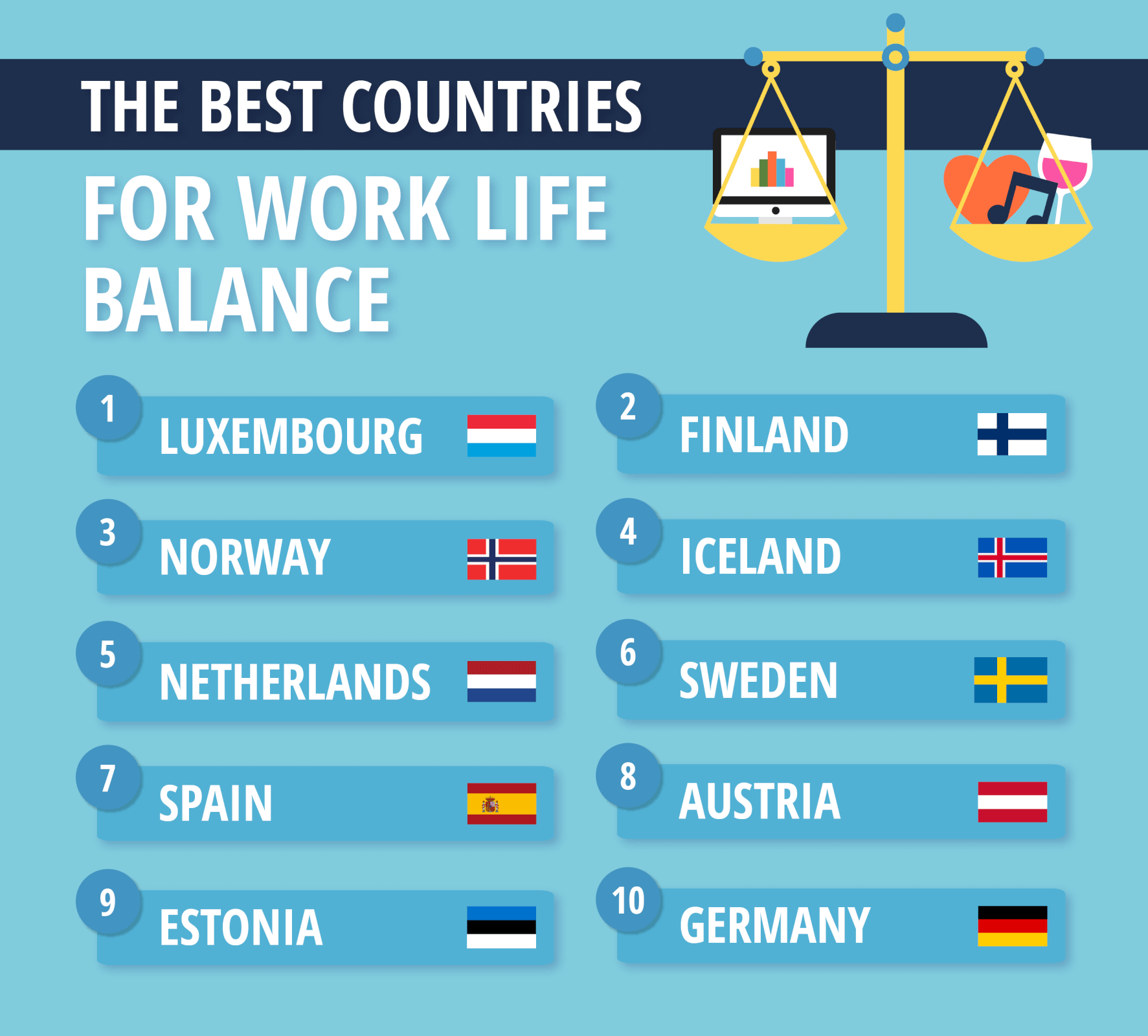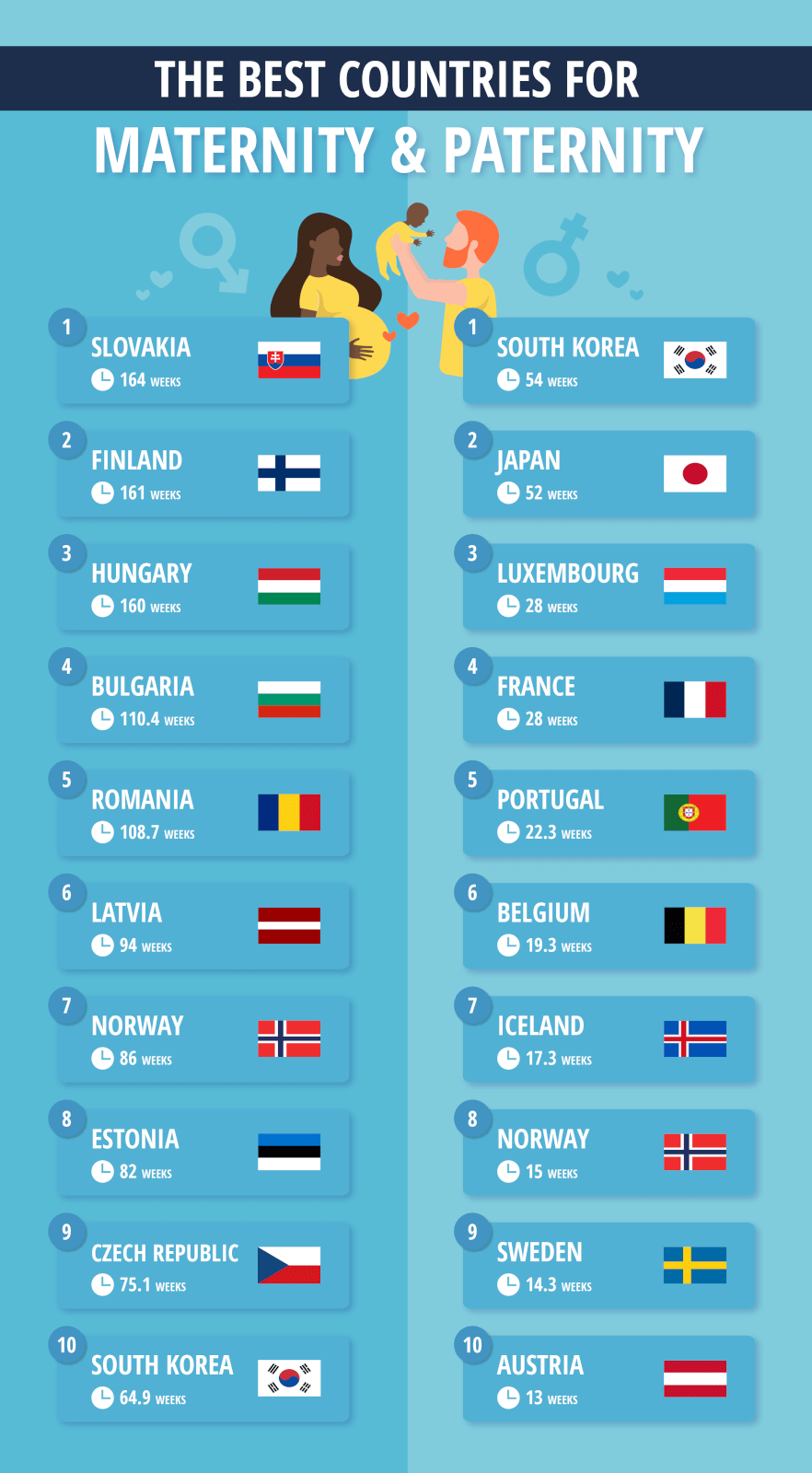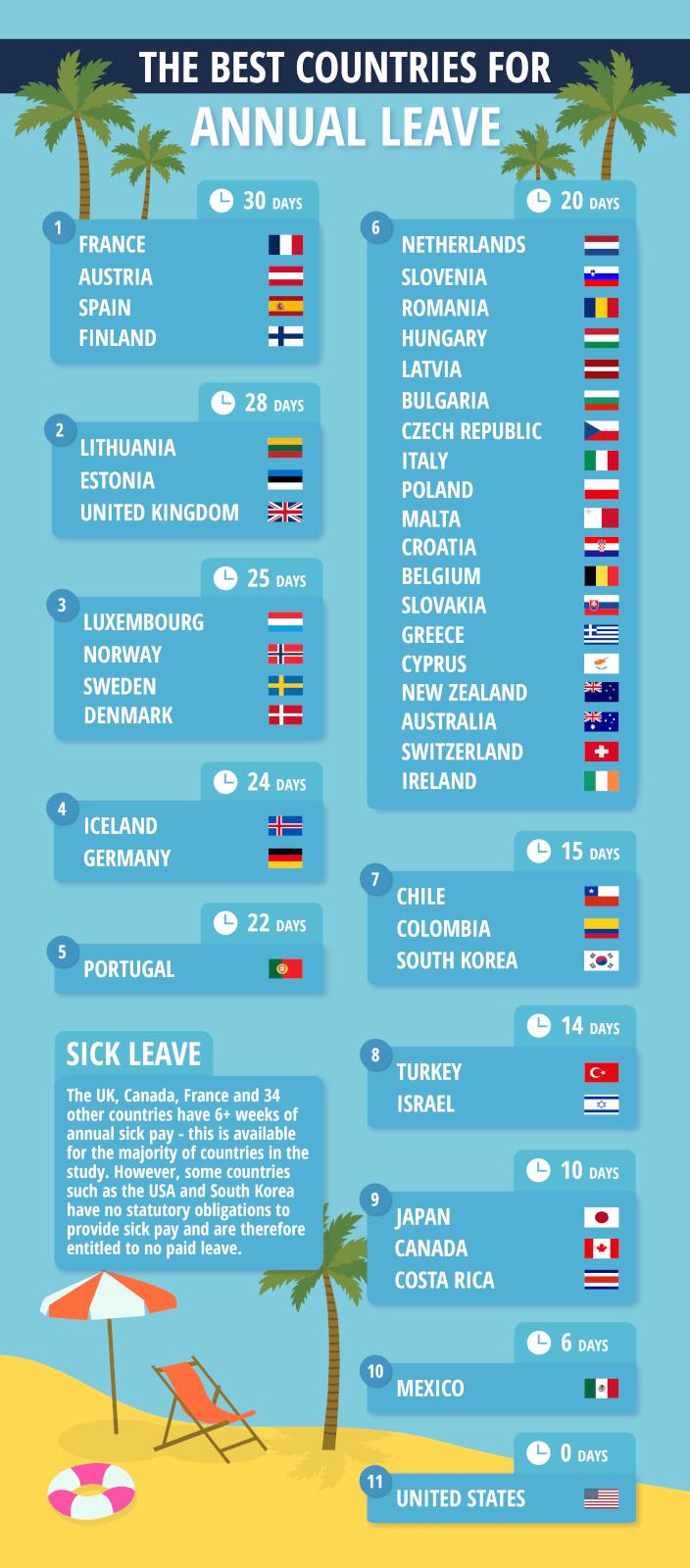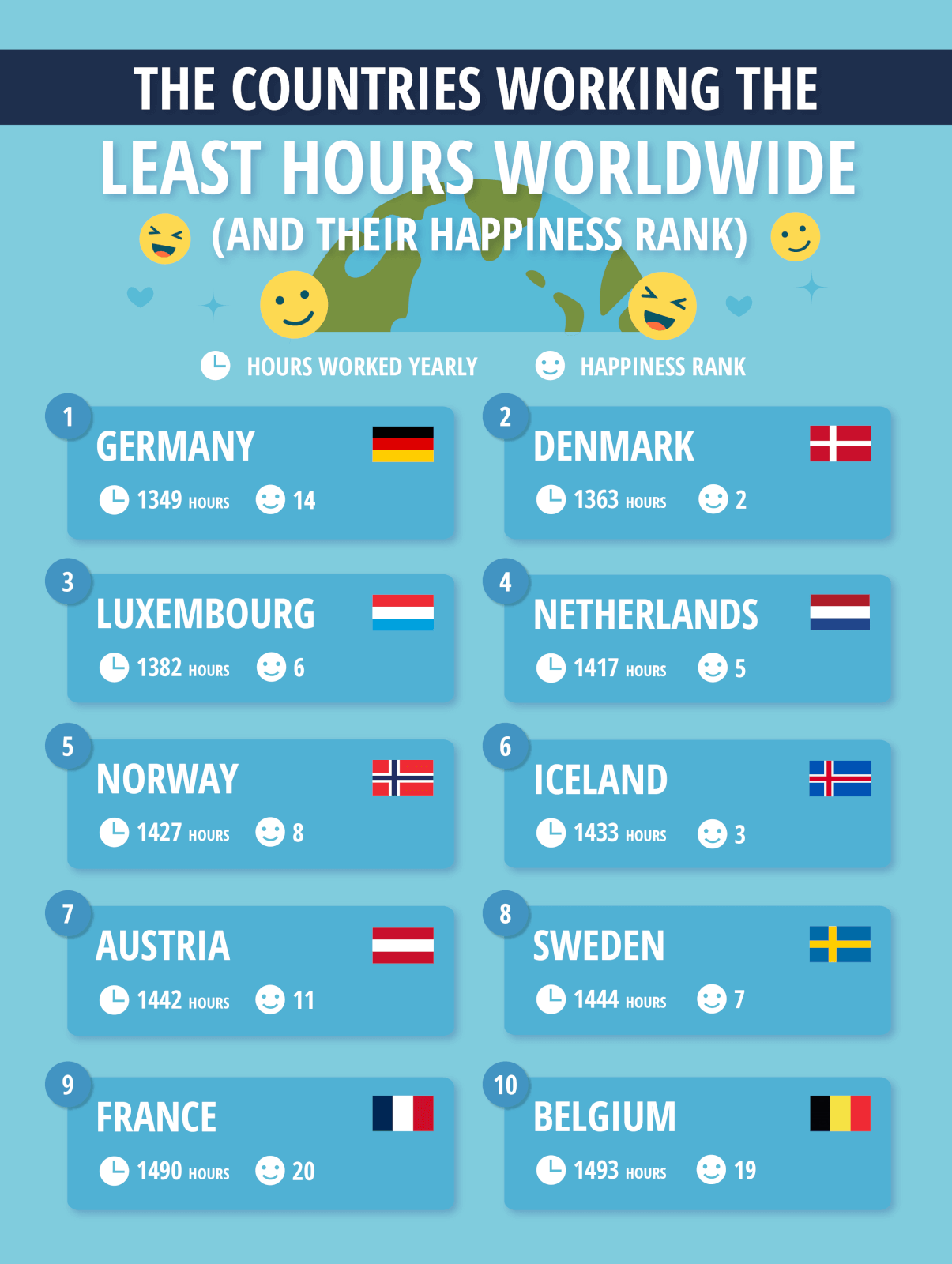The Burrow

Work takes up such a significant part of our days and weeks, that, if we’re not enjoying it, it can have a detrimental impact on the quality of our lives.
Whilst COVID-19 has brought about hybrid working, which has left many people feeling like they have a healthier work-life balance, with commuting times cut down, and school drop-offs and pick-ups made easier, a recent survey found that 46% of Australians suffered from burnout in the first three months of 2022.1
For 24% of those surveyed, it was because they’d taken on more responsibilities in their role, and 32% felt overwhelmed by the amount of work they had to complete.
With all of us striving for a better work-life balance to improve our overall health, we decided to uncover the countries in the world that offer it. So, we looked at several factors including average hours worked, maternity and paternity pay, sick pay, and happiness scores to find out the best countries in the world for achieving a healthy balance of work and play.
We also look at ways that you can reduce the level of stress in your life, and how health insurance can be a vital factor in supporting your journey towards good health.

Topping the list is Luxembourg, with its annual working hours one of the lowest, at 1,382 (just Germany and Denmark rank higher). One thing that’s extremely attractive is the paternal paid leave, which they cover for 28 weeks – much higher than Australia and the UK, at just two weeks. They also score well for happiness, with Luxembourg coming sixth overall.
Finland, Norway, Iceland, and the Netherlands make up the remainder of the top five, with all of them offering 6+ weeks of paid sick leave, and extremely high rates of maternity leave.
It comes as no surprise that the Nordics dominate our top 10 list, as they constantly rank as the happiest countries in the world. In fact, Finland has been crowned the happiest country in the world five times, with Denmark and Iceland topping the lists too.2
Finland has the second highest paid maternal leave on our list, just behind Slovakia, at 161 weeks (that’s over three years!), and 30 days of paid annual leave a year.
When it comes to happiness, Finland, Denmark, and Iceland make up the top three, suggesting that great work perks and a work-life balance makes people happier in their lives.
Sweden makes it into sixth place, while the rest of the top 10 are dominated by European countries – with Spain, Austria, Estonia and Germany all promoting a good work-life balance.

We know that Scandinavia pays well, but it turns out they don’t lead the way when it comes to maternity leave. In fact, it’s Slovakia that tops the list, at 164 weeks of paid leave. Finland isn’t far off, in second place, with Hungary, Bulgaria and Romania making up the top five.
The USA is the only country in the world to not offer any maternal paid leave, with Mexico and Switzerland offering low amounts, at 12 and 14 weeks respectively.
Paternal paid leave, on the other hand, is significantly average in Australia and the UK at just two weeks, with so many countries offering better pay.
South Korea and Japan are top of the list, at 54 and 52 weeks of paid leave for new dads respectively, with France and Luxembourg next on the list, both at 28 weeks.
There are quite a few countries that don’t offer any paid paternal leave at all – the US, Switzerland, Israel, Costa Rica, New Zealand, and Slovakia.

Whilst in Australia, 20 days of paid annual leave is the norm, Finland, Austria, France and Spain all offer an extra 10 days; and the UK rates highly too, with 28 days.
At the bottom of the list is America, with nothing at all, joined by Mexico in second to last place, with just six days of paid holidays a year.

Finally, when looking at the number of hours worked over the year, people in Germany work the least, at 1,349, followed by Denmark, Luxembourg, the Netherlands and Norway. At the other end of the spectrum, Mexicans work almost twice the number of hours as Germans, at 2,128 a year, with Costa Rica and Colombia not far behind; showing that countries that work less hours, tend to feature higher up on the happiest countries lists.
If you find that you can’t concentrate at work, lack energy, struggle to get to sleep, or feel a sense of dread in the mornings, you could be heading towards a burnout, and more significant long-term health problems.
However, even if you aren’t suffering from such extreme symptoms, you might feel like you want to claim back more of your personal life. These top tips can help you to strike that balance.
When we start a new job, we want to go above and beyond to prove to ourselves – and to everyone we work with – that we were worth hiring. However, saying yes to every extra thing can leave you feeling stressed, anxious, and overwhelmed.
Don’t be afraid to set boundaries. If you’re working long hours every night of the week, let your boss know your workload is unreasonable, and switch off email notifications outside of working hours so you aren’t distracted.
Similarly, if someone asks for a deadline that’s unachievable, or wants you to do something that’s not in your job remit, and that you know will cause you unnecessary stress, just say no. Trust us when we say it’ll be hardest the first time you say it, but over time, people will begin to know your boundaries, which will hopefully lead to fewer requests in the long-term.
Yoga, meditation, and Pilates are all great ways to destress, so can be worth a go. Alternatively, if they don’t work for you, try another form of exercise, whether that’s running, dancing, or lifting weights. If regular visits to a gym or health centre seem appealing to you, it could be worth considering a health insurance extras policy that offers benefits towards these types of memberships.
Allocating a bit of time every day to get your heartbeat racing will give you something else to focus on other than work, and will hopefully leave you feeling refreshed, and ready to tackle whatever the day brings. It can also have a positive impact on your stress levels and overall mental health, improving the balance between your work and personal life.
If you don’t get enjoyment out of your job anymore, and the thought of Monday morning fills you with dread, then it could be time to move on.
Have a think about what you actually want to do – maybe you want to work in the same industry, or have a completely different career change? Once you’ve accepted it’s time to move on, that alone could leave you feeling a huge sense of relief, knowing that you’ve come to a conclusion.
When your life lacks balance between personal and work commitments, it can easily lead to significant health effects. For example, stress from work-related events can cause anxiety disorders, weight gain or loss, a general lack of appetite or the inability to find appropriate exercise time.
Having a health insurance policy that suits your circumstances could mean you are covered for such medical events. Policies can range from hospital cover to extras cover, or a combination of the two, and will vary again when it comes to the specific medical services they include.
For example, gold hospital policies include unrestricted cover for inpatient psychiatric services, which could be useful if you are experiencing high levels of stress due to a lack of appropriate work-life balance. If it’s psychology services you are after, an extras cover policy may be more appropriate. Some health funds may also offer health programs, which can include mental health support.
If you find that physical exercise is more valuable in easing stress and work-related tension, consider an extras policy that can help cover the cost of gym memberships, fitness classes, or other related benefits.
The latest report published by the Australian Competition and Consumer Commission (ACCC) stipulated that while the number of Australians with an extras-only policy has grown in recent years, it still only sits at 9.8% of the population.3 This excludes the number of Australians who hold combined hospital and extras cover. Conversely, as many as 30.8% of Australians have a gym membership.4 Whichever way you look at it, there’s a considerable portion of the population that could be missing out on financial support for important health-related benefits.
If you’re looking to protect yourself in this manner, the health insurance experts at Compare the Market can help to guide you towards a policy that suits your needs, to give you total peace of mind.
This data shows a ranking of countries based on work-life balance. To create this ranking, 8 factors relating to work-life balance were selected. The data for these factors was then collected and indexed, to give each factor a score between 0 and 1. These scores were then summed, to give a total score out of 8 for each country. The countries were then ranked from highest to lowest, based on this score.
The factors are as follows:
The factors were indexed as follows: